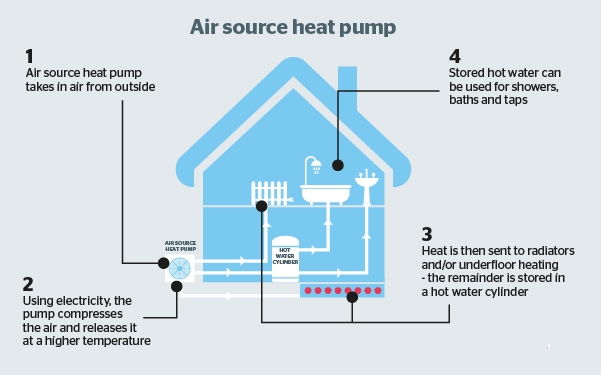You can manage your cookie preferences in the sections below. If you would like to know more, please view our privacy & cookie policy.
What are heat pumps?
Heat pumps are an alternative to gas boilers. They work by transferring heat from the air into a fluid that then passes through a heat exchanger and into the heat pump. The heat generated is then used to warm up radiators and underfloor heating, as well water stored in a hot water cylinder for taps and showers.
They work a bit like a fridge, but in reverse.

Are heat pumps environmentally friendly?
Heat pumps are more environmentally friendly than traditional boilers as they don’t rely on gas to power them.
Gas boilers work by pumping water through pipes that are heated by a series of gas flames. This hot water can then be run though household taps or used for central heating. This whole system is reliant on the use of fossil fuels, and even though modern boilers are much more energy efficient than older models, this isn’t an environmentally friendly way to heat our homes.
Although heat pumps run on electricity, they are much less reliant on fossil fuels than gas boilers and have a much better efficiency rate – while an old gas boiler has an efficiency rate of 55% to 65% and a new condensing boiler has an efficiency rate of up to 92%, heat pumps have an efficiency rate of between 400% and 600%.
If you power your heat pump using electricity generated by solar panels, you can make your home heating system almost completely self-sufficient.
What are the advantages and disadvantages of heat pumps?
As with any type of technology, there are number of pros and cons. In short, the main advantages are reduced emission and lower running costs, but these must be weighed up against issues of practicality and cost.
What are the advantages of installing a heat pump?
- More environmentally friendly as they generate less CO2
- Lower running costs
- Easier to maintain than gas boilers
- Safer than gas boilers (no chance of a carbon monoxide leak)
- Can be switched to a cooling system in warmer weather
- Longer life span than gas boilers (theoretically 50 years, but about 15 is probably more realistic)
What are the disadvantages of installing a heat pump?
- High up-front cost
- They can be difficult to install and might not be suitable for all properties
- They may not be as efficient in cold weather
- Certain heat pump fluids can be more damaging than CO2 if leaked (though there are now more eco-friendly alternatives)

Is your property suitable for a heat pump?
There are two types of heat pump available:
- Monobloc – Although cheaper and quicker to install, these systems sit outside your home and carry hot water to your heating system and water cylinder through a series of pipes. This is probably the best option if you have limited indoor space, but these systems are slightly less efficient.
- Split system – These systems are made up of an indoor unit and an outdoor unit and suitably will depend on whether you have enough space in your home. These systems are also more expensive but are more energy efficient as some of the heat transfer takes place inside the building, where it is warmer.
How much do heat pumps cost?
Cost is the main issue with heat pumps, as they are often a lot more expensive than gas boilers. You should expect to anywhere from £7,000 to £13,000, but the price you pay will depend on the brand, model and size of the heat pump you need.
The price might also increase if you need to make any changes to the heating system in your home - these systems work best with underfloor heating or large radiators.
It’s best to get a number of quotes before committing to getting one fitted.
Are any grants available for heat pump installation?
Heat pumps aren’t supported by the Renewable Heat Incentive (RHI), but the government has announced plans to provide households with grants of up to £5,000 to help people to allow people to install home heat pumps and other low-carbon boiler replacements.
This is part of the government’s net-zero strategy and the idea is that the funding offered should mean heat pumps installation should cost no more than that of a gas boiler.
What if my boiler breaks down?
A boiler breakdown is probably not something any of us consider until it’s too late – this video explains what to do if your boiler breaks down.Click here to run an energy price comparison, and see if you could be paying less for your gas and electricity.


